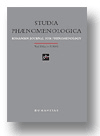
Studia Phaenomenologica
Scope & Guideline
Navigating the Landscape of Contemporary Phenomenology
Introduction
Aims and Scopes
- Interdisciplinary Dialogue:
The journal encourages dialogue between phenomenology and other fields such as cognitive science, sociology, and the philosophy of science, fostering a comprehensive understanding of human experience. - Phenomenological Foundations:
A core area of focus includes the foundational aspects of phenomenology, particularly the works of key figures like Husserl, Heidegger, and Merleau-Ponty, exploring their implications for understanding consciousness and perception. - Exploration of Temporalities:
The journal frequently addresses themes of temporality and the lived experience of time, reflecting on how these concepts relate to human existence and philosophical inquiry. - Embodiment and Corporeality:
There is a consistent emphasis on the body and corporeal experience, examining how bodily presence influences perception, interaction, and meaning-making. - Hermeneutical Phenomenology:
A significant focus on hermeneutics within phenomenology is evident, exploring the interpretative dimensions of human experience and the role of language and imagery in shaping understanding.
Trending and Emerging
- Phenomenology and the Sciences:
A notable trend is the integration of phenomenology with scientific disciplines, particularly cognitive science and quantum mechanics, illustrating a growing interest in how phenomenological insights can inform scientific understanding. - Digital and Virtual Realities:
Themes exploring the phenomenology of virtual reality and digital images are emerging, indicating a response to contemporary technological advancements and their implications for perception and experience. - Ethical and Political Dimensions:
There is an increasing focus on the ethical and political ramifications of phenomenological thought, particularly in relation to testimony, justice, and community, reflecting broader societal concerns. - Temporal Experience and Memory:
Recent papers emphasize the significance of temporality and memory in shaping human experience, indicating a revitalized interest in how these themes intersect with phenomenological analysis. - Interdisciplinary Applications:
The journal is increasingly showcasing how phenomenological methods can be applied across various fields, including art, literature, and social theory, highlighting its versatility and relevance.
Declining or Waning
- Traditional Metaphysical Themes:
Topics centered around traditional metaphysics and its critiques have seen a decline, as the journal shifts towards more empirical and interdisciplinary approaches. - Analytical Philosophy Engagement:
There appears to be a waning interest in direct engagements with analytical philosophy, as the journal focuses more on phenomenological and hermeneutical perspectives. - Historical Contextualization of Phenomenology:
The exploration of phenomenology's historical roots and its relationship to earlier philosophical traditions has diminished in favor of contemporary applications and discussions.
Similar Journals

Studia Universitatis Babes-Bolyai Philosophia
Advancing Intellectual Discourse in PhilosophyStudia Universitatis Babes-Bolyai Philosophia is a distinguished academic journal published by UNIV BABES-BOLYAI, focusing on a wide array of topics in the field of philosophy. With its ISSN 1221-8138 and E-ISSN 2065-9407, this journal serves as a significant platform for researchers, scholars, and students to disseminate their findings and engage in intellectual discourse. Located in the scholarly environment of Cluj-Napoca, Romania, it aims to promote philosophical inquiries that intersect with contemporary issues, fostering a rich dialogue within the academic community. While the journal currently operates under a traditional access model, its commitment to advancing the philosophical discipline is deeply rooted in rigorous peer review and scholarly excellence. Authors and readers alike are encouraged to contribute to and draw from the rich repository of knowledge that this journal cultivates.
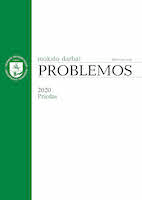
Problemos
Connecting Scholars Through Rich Philosophical DialogueProblemos is an esteemed academic journal published by VILNIUS UNIV PRESS, dedicated to advancing research in the field of Philosophy. With an ISSN of 1392-1126 and E-ISSN 2424-6158, this open-access journal has been disseminating knowledge and fostering scholarly dialogue since 2005. Situated in Lithuania, Problemos has gained recognition, achieving a prestigious Q2 category ranking in the 2023 Philosophy category and a Scopus rank of #458 out of 806, placing it in the 43rd percentile. The journal covers a broad spectrum of philosophical inquiries, making it an essential resource for researchers, professionals, and students seeking to engage with contemporary philosophical discourse. By offering unrestricted access to its content, Problemos promotes the free exchange of ideas and encourages collaboration across disciplines, establishing itself as a pivotal platform within the academic community.

Lebenswelt-Aesthetics and Philosophy of Experience
Bridging Aesthetics and Philosophy for a Richer UnderstandingLebenswelt-Aesthetics and Philosophy of Experience is a distinguished academic journal published by Milano University Press, located in the heart of Italy. With a commitment to fostering open access dissemination of knowledge since 2011, this journal serves as a vital platform for scholars and students in the fields of aesthetics and philosophy, facilitating innovative discussions and research pertaining to human experience. The journal aims to explore the intricate relationships between lived experience and aesthetic theory, making significant contributions to contemporary philosophical discourse. Although it currently holds a Q4 ranking within the philosophy category of Scopus, its open access format and focus on interdisciplinary connections are invaluable for researchers seeking to engage with cutting-edge ideas. As it converges on themes of practical relevance and philosophical inquiry, Lebenswelt-Aesthetics and Philosophy of Experience invites contributions that enrich our understanding of the complexities of human perception and aesthetic appreciation.
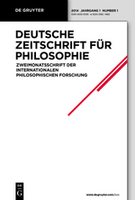
DEUTSCHE ZEITSCHRIFT FUR PHILOSOPHIE
Cultivating a rich tradition of philosophical scholarship.DEUTSCHE ZEITSCHRIFT FUR PHILOSOPHIE is a prominent academic journal dedicated to advancing the field of philosophy, published by WALTER DE GRUYTER GMBH. Since its inception in 1953 and extending its converged years to 2024, it has been a pivotal platform for scholarly discourse, fostering critical thought and innovative ideas in philosophical studies. With its ISSN 0012-1045 and E-ISSN 2192-1482, the journal holds a commendable position in the academic community, recognized as a Q2 journal in the 2023 Philosophy category, currently ranked #390 out of 806 in the Scopus Arts and Humanities rankings, placing it in the 51st percentile. Although it does not offer open access, its commitment to rigorous peer review ensures that each publication meets high academic standards, making it an invaluable resource for researchers, professionals, and students seeking to engage with contemporary philosophical debates and theories. The journal is situated in Berlin, Germany, at Genthiner Straße 13, D-10785 Berlin, Germany, and continues to be an essential outlet for philosophical inquiry and scholarly achievement.

Phainomena
Advancing Scholarly Discourse Across ErasPhainomena is a distinguished academic journal published by the INST NOVE REVIJE ZAVOD HUMANISTIKO and the FENOMENOLOSKO DRUSTVO LJUBLJANI, dedicated to the exploration of philosophical inquiries that address both contemporary and historical perspectives. Since its establishment, it has maintained an Open Access policy since 2018, fostering wider dissemination of knowledge within the philosophical community and beyond. The journal operates out of Slovenia and is recognized in the 2023 category quartiles as Q3 in Philosophy, positioning it within a competitive landscape ranked #598 out of 806 in Scopus's arts and humanities classification, indicating a growing influence despite its current percentile of 25th. With converged publication years from 2009 to 2013, and continuing through 2015 to 2024, Phainomena aims to provide a platform for scholarly dialogue and innovative thought. The journal invites researchers, professionals, and students to contribute to and engage with a wealth of philosophical discourse that bridges diverse philosophical traditions and contemporary issues.
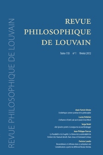
REVUE PHILOSOPHIQUE DE LOUVAIN
Illuminating Philosophical Discourse Since 1973REVUE PHILOSOPHIQUE DE LOUVAIN is a distinguished academic journal dedicated to the exploration of philosophical discourse and thought, published by PEETERS in Belgium. With an ISSN of 0035-3841 and E-ISSN 1783-1768, this journal has been a significant contributor to the field of philosophy since its inception in 1973. Although it has been classified in Q4 in the 2023 Philosophy category with a Scopus rank of 488 out of 762, the journal has established a reputation for fostering rigorous dialogue and covering a diverse array of philosophical topics through comprehensive articles and critical essays. Despite a temporary discontinuation in Scopus coverage from 2019 to 2021, REVUE PHILOSOPHIQUE DE LOUVAIN remains a significant platform for scholars, professionals, and students looking to engage deeply with contemporary philosophical issues. The journal's commitment to philosophical inquiry is complemented by its accessible publication model, although it does not currently offer open access options. For those based in or visiting Leuven, Belgium, the journal's office is located at BONDGENOTENLAAN 153, B-3000 LEUVEN, BELGIUM, a hub of intellectual engagement in the heart of Europe.
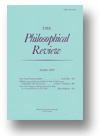
PHILOSOPHICAL REVIEW
Fostering Intellectual Growth and InquiryPHILOSOPHICAL REVIEW, published by DUKE UNIVERSITY PRESS, is a leading academic journal in the field of philosophy, recognized for its rigorous scholarship and impactful contributions to theoretical and applied philosophy. With an impressive Q1 ranking in the 2023 Scopus metrics, it places within the top percentile of philosophical journals, affirming its significance in the discourse. The journal, which has a rich publication history since its inception in 1970, focuses on a diverse range of philosophical topics, catering to a broad audience of researchers, practitioners, and scholars. Although it doesn't offer Open Access options, its articles remain highly sought after for their depth and quality. With a dedicated readership and a commitment to exploring fundamental philosophical questions, PHILOSOPHICAL REVIEW continues to shape contemporary philosophical thought and engage with pressing issues in various domains.

Journal of French and Francophone Philosophy
Fostering Access to Scholarly Excellence in Philosophy.Journal of French and Francophone Philosophy is a prominent academic journal dedicated to the exploration and dissemination of scholarly work in the field of French and Francophone philosophy. Published by the University of Pittsburgh Library System, this journal has been a significant player in the discourse on philosophical thought since its inception in 1989, operating under an Open Access model to ensure broad accessibility to its content. With its ISSN 1936-6280 and E-ISSN 2155-1162, the journal highlights critical debates, methodologies, and cultural contexts that shape French and Francophone philosophical traditions. The journal's commitment to academic excellence is underscored by its adherence to high scholarly standards, making it an essential resource for researchers, professionals, and students eager to engage with contemporary philosophical issues and historical analyses alike. By facilitating dialogue among diverse philosophical perspectives, it continues to enhance the academic landscape and promote the relevance of French and Francophone thought in a global context.

Investigaciones Fenomenologicas
Fostering Dialogue in the Realm of PhenomenologyInvestigaciones Fenomenologicas is a pioneering journal in the field of phenomenological research, dedicated to exploring the depths of human experience and consciousness. Published by the UNIV NACL EDUCACION & DISTANCIA-UNED in Madrid, Spain, this journal serves as a vital platform for scholars and practitioners who strive to deepen their understanding of phenomenology and its applications in various disciplines, including psychology, education, and the social sciences. With a commitment to fostering intellectual dialogue, Investigaciones Fenomenologicas invites contributions that challenge conventional paradigms and enrich the academic landscape through empirical studies, theoretical discussions, and critical analyses. While currently not open access, the journal’s exclusive focus on phenomenology makes it an essential resource for researchers and students aiming to stay abreast of the latest developments and methodologies in this evolving field. ISSN: 1885-1088.

Pensando-Revista de Filosofia
Navigating the Landscape of ThoughtPensando-Revista de Filosofia, an esteemed publication by UNIV FEDERAL PIAUI, EDITORA, serves as a vibrant platform for philosophical discourse and exploration, anchoring its significance within the field of philosophy. With the ISSN 2178-843X, this journal aims to promote critical thinking and disseminate innovative ideas that advance the study of philosophical theories, contemporary issues, and interdisciplinary approaches. Although it currently operates under non-open access terms, researchers and scholars can look forward to insightful articles that contribute to enriching the philosophical landscape. The journal is nestled in Bom Jesus, Piauí, Brazil, and welcomes submissions that engage with both traditional philosophical frameworks and contemporary dilemmas, encouraging a diverse array of perspectives. With a commitment to academic rigor and an aim to inspire both professionals and students alike, Pensando stands as a crucial resource for anyone eager to deepen their understanding of philosophy and its relevance in today's world.